新概念一册Lesson91 Poor Ian
新概念英语第一册第91课
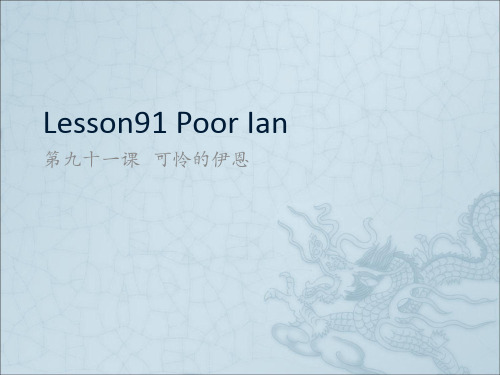
语法 演讲
口语表达 作文
目前尚可 由于时间关系未进行
由于时间关系未进行 不错,但注意一些细节的语法问题
其他需要注意 做题的时候要仔细,开口的时候要大胆。
Let’s learn more
Person 表示单个人 People 表示人们,是复数。 She’s the right person for this job. There’re a lot of people in the park. 我们家有三口人。 他是做老师的不错人选。
homework
1.翻译短文。听写91,35,36单词,错一个改 五遍。并背会课文。 2.自己安排读课文、预习课文和自学课文. 每天都要保证高质量地读两遍。 3.每天复述一遍课文。 4.奥特曼打小怪兽 5.准备演讲,题目自拟。准备Topic.
冯千禧五年级下第3次课堂表现
日期 作业 态度 听力 发音 语音语调 2011年2月26日 完成得很好 上课态度认真,只是在纠音的过程中觉得有点枯燥 需要仔细分辨资料中容易混淆的句子 希望每次发音的时候都能够将口型完全打开,声音放出来 常常有开头部分读得重,越到后来声音越轻的现象,希望尽快矫 正。
一般将来时
一般将来时表示将来某一时刻的动作或状 态,或将来某一段时间内经常的动作或状 态。常常和表示将来的时间状语连用。如: tomorrow(明天), next week(下周), from now on(从现在开始);in the future (将来)等。 一般将来时由助动词shall (第一人称),will(第二、三人称) 动词 原形构成。美国英语则不管什么人称,一 律用will。
来看这一组句子
每课一句:新概念英语第1册第91课
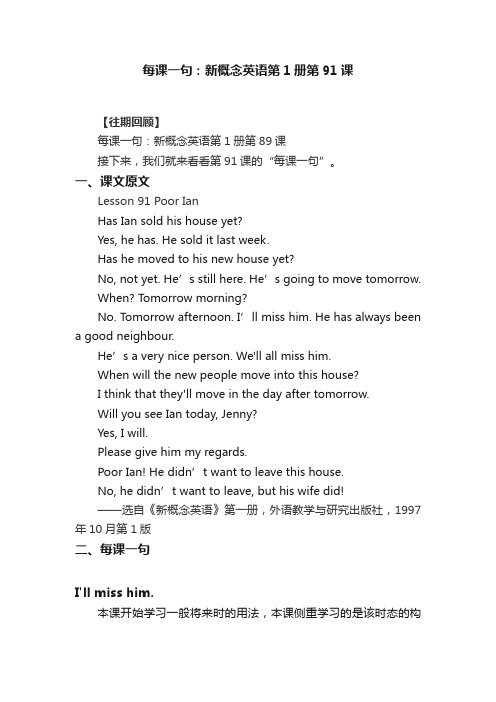
每课一句:新概念英语第1册第91课【往期回顾】每课一句:新概念英语第1册第89课接下来,我们就来看看第91课的“每课一句”。
一、课文原文Lesson 91 Poor IanHas Ian sold his house yet?Yes, he has. He sold it last week.Has he moved to his new house yet?No, not yet. He’s still here. He’s going to move tomorrow.When? Tomorrow morning?No. Tomorrow afternoon. I’ll miss him. He has always been a good neighbour.He’s a very nice person. We'll all miss him.When will the new people move into this house?I think that they'll move in the day after tomorrow.Will you see Ian today, Jenny?Yes, I will.Please give him my regards.Poor Ian! He didn’t want to leave this house.No, he didn’t want to leave, but his wife did!——选自《新概念英语》第一册,外语教学与研究出版社,1997年10月第1版二、每课一句I'll miss him.本课开始学习一般将来时的用法,本课侧重学习的是该时态的构成方式、基本用法和标志词tomorrow系列的用法。
一、构成方式一般将来时的构成方式为will do,其中will为助动词,口语中常可缩略为“'ll”,do为动词原形。
(完整版)新概念英语第一册第91课课件

(完整版)新概念英语第⼀册第91课课件Lesson 91Poor Ian!1: still adv 还,依旧I still can’t decide where to go.⑴静⽌地Eg: He is sitting still.2: move V 搬家⑴Move from…to…从…搬到…Eg: They move from Nanjing to Shenzhen.⑵移动Don’t move that chair.⑶使感动,使动⼼Eg: Her song moved us greatly.3: miss V 想念,思念Eg: we will miss you very much if you move.I miss you so much!⑵注意到…的不存在When did you miss your bag?⑶错过或失去机会I missed a good chance. 4: neighbor N 邻居A good neighbor5: person N ⼈Eg: He is a nice person.In person 亲⾃,直接地Eg: He will go to get the money in person. Personal adj 个⼈的,私⼈的A personal letter6: people N ⼈们The people 民众,⼈民,国民7:poor adj 可怜的Eg: The poor old woman had no one to talk to.⑵贫穷的—richA poor manA poor villageThe poorEg: we should help the poor.⑶差劲的Be poor at sthBe poor at doing sthBe good at sthBe good at doing sthEg: My daughter is poor at swimming.Context:1: move to…搬家到…Eg: All her family have moved to the US.Move in 搬进(强调结果)Eg: His new neighbour moved in last week.Move out2: be going to do 打算做某事Eg: I’m not going to argue with you tonight.3: I’ll miss him.Miss 想念I miss my parents very mush.4: He has always been a good neighbour.现在完成时只要⽤于两种情况:1.表⽰在过去不确定的时间⾥发⽣的并与现在有着某种联系的动作2.开始于过去并持续到现在的动作5:all ⼤家,全部(3个或3个以上的⼈或物)两者6:new people 新住户Move into 搬进来(强调过程)Move in 搬进来(强调结果)7:give sb sthGive sth to sb 把…给某⼈Regards (复) 致意,问候Give him my regards Give my regards to him. 8: leave 离开Leave…for…离开…去…Eg: when will you leave China for England.Lesson 92When will…?语法:⼀般将来时⼀般将来时表⽰将来某⼀时刻的动作,状态以及打算。
新概念英语第一册第91

新概念英语第一册第91Lesson 91 Poor Ian!可怜的伊恩!Listen to the tape then answer this question.Who wanted to sell the house听录音,然后答复下列问题。
谁想卖房?Mrs Smith: Has Ian sold his house yet凯瑟琳:伊恩已指他的房子卖掉了吗?Mrs Brown: Yes, he has. He sold it last week.詹尼:是的,卖掉了。
他上星期卖掉的。
Mrs Smith: Has he moved to his new house yet凯瑟琳:他已经迁进新居了吗?Mrs Brown: No, not yet. He s still here. He s going to move tomorrow.詹尼:不,还没有。
他仍在这里。
他打算明天搬家。
Mrs Smith: When Tomorrow morning凯瑟琳:什么时候?明天上午吗?Mrs Brown: No. Tomorrow afternoon. I ll miss him. He has always been a good neighbour.詹尼:不,明天下午。
我会想念他的。
他一直是个好邻居。
Mrs Green: He s a very nice person. We shall all miss him.琳达:他是个非常好的人,我们大学都会想念他的。
Mrs Smith; When will the new people move into this house凯瑟琳:新住户什么时候搬进这所房子?Mrs Brown: I think that they will move in the day after tomorrow.詹尼:我想他们将会在后天搬进来吧。
Mrs Green: Will you see Lan today, Mrs Brown琳达:詹尼,您今天会见到伊恩吗?Mrs Brown: Yes, I will.詹尼:是的,我会见到他。
新概念英语第1册第91-92课重点语法和词汇讲解

新概念英语第1册第91-92课重点语法和词汇讲解新概念英语第1册第91-92课重点语法和词汇讲解导语:有时候搬家不是因为想离开,而是不得不离开,下面是一篇关于这方面的英语课文,欢迎大家阅读。
Lesson 91 Poor Ian!可怜的伊恩!Listen to the tape then answer this question.Who wanted to sell the house?听录音,然后回答问题。
谁想卖房?Mrs Smith: Has Ian sold his house yet?凯瑟琳:伊恩已指他的房子卖掉了吗?Mrs Brown: Yes, he has. He sold it last week.詹尼:是的,卖掉了。
他上星期卖掉的。
Mrs Smith: Has he moved to his new house yet?凯瑟琳:他已经迁进新居了吗?Mrs Brown: No, not yet. He’s still here. He’s going to move tomorrow.詹尼:不,还没有。
他仍在这里。
他打算明天搬家。
Mrs Smith: When? Tomorrow morning?凯瑟琳:什么时候?明天上午吗?Mrs Brown: No. Tomorrow afternoon. I’ll miss him. He has always been a good neighbour.詹尼:不,明天下午。
我会想念他的。
他一直是个好邻居。
Mrs Green: He’s a very nice person. We shall all miss him.琳达:他是个非常好的人,我们大学都会想念他的。
Mrs Smith; When will the new people move into this house?凯瑟琳:新住户什么时候搬进这所房子?Mrs Brown: I think that they will move in the day after tomorrow.詹尼:我想他们将会在后天搬进来吧。
新概念英语第一册91课最新版本
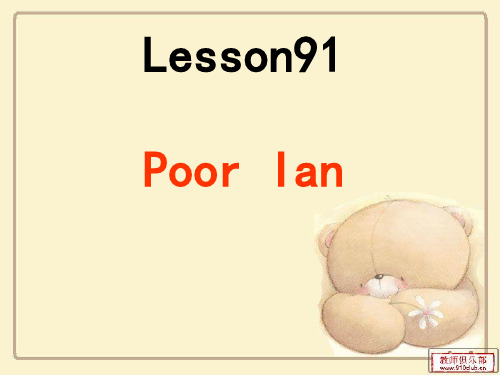
★move v. 搬家;感动 The story moves me. move to 搬到……地方 move in 搬进 move out 搬出来 move away 搬走 move into 搬进(由外到内的过程)
精品课件
★miss v. 想念,思念 ① v. 想念,惦念 ② v. 错过;未做到 He overslept and missed his train. 他睡过了头,错过了他那班火车。 I missed an opportunity of realizing my dream. 我错过了一个可能实现自己梦想的机会。
名词 表示民族时 可加s ten people 十个人 56 peoples 56个民族 the peoples of China and USA (指两国人民,用复数形式)
精品课件
一般将来时 (Will + 动词原形)
past
present(now) future
Lesson91 Poor Ian
精品课件
一 词汇
still adv. 还,仍旧 move v. 搬家 miss v. 想念,思念 neighbour n. 邻居 person n. 人 people n. 人们 poor adj. 可怜的
精品课件
★still adv. 还,仍旧 ① adv. 还是,仍然 I still don’t understand what he meant. ② adv. 还要,甚至更 She looked very ill last week and this week looks still worse. ③ adv. 静止地;安静地 He is sitting still. 他一动不动地坐 着。 The patient is ly精i品n课g件 still. 病人安静
(完整版)新概念第一册Lesson91-92
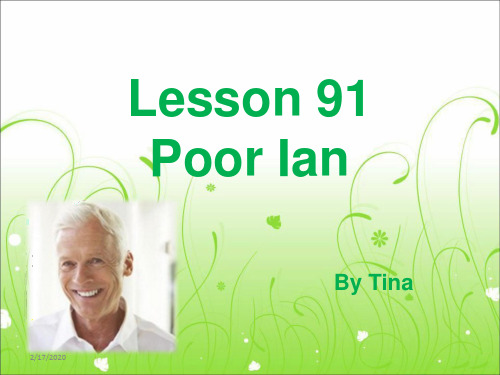
person和people用法:
person 强调的个体的人, 可以有复数形式 persons
people 通常是人的统称, 单复数形式相同
★ poor [puə] adj. 可怜的
① v. 想念,惦念 • I missed you.
我想你
② v. 错过;未做到 • He overslept and missed his train. • 他睡过了头,错过了他那班火车。
• miss doing sth. 未能 I missed buying the magazine. 我未能买到那本杂志。
(4)表示说话前发生过一次或多次的动作,现 在成为一种经验,一般译为汉语“过”,
常带有twice , ever, never,three times 等 时间状语。
I have been to Beijing twice. 我去过北京两次。
不规则动词的过去式以及过去分词 巧记规律
• AAA: put– put –put let—let –let • ABA: become—became—become • ABB: stand—stood—stood • ABC: eat— ate—eaten
v. 想念,思念 n. 邻居 adv. 还,仍旧 v. 搬家 n. 人 adj. 可怜的 n. 人们
Grammar
• 复习:现在完成时
★ 现在完成时的用法:(1)现在完成时表示过 去某时发生的行为对主语目前产生的影响。即
用过去发生的某个行为来说明现在的某种情况。
• 肯定句式: 主语+have (has)+p.p • 否定句式: 主语+have (has)+not +p.p • 一般疑问句: Have (Has)+主语+p.p? • 特殊疑问句:
新概念英语单词第一册第91课:可怜的伊恩

新概念英语单词第一册第91课:可怜的伊恩Lesson91: Poor Ian第91课:可怜的伊恩still还,仍旧You know our company is a newly-built one.Things will go better with development.你知道我们公司刚成立不久,所有事情都会随着发展而好起来的。
Maybe.Thank you for your help,but I still want to leavethe company to seek development.也许吧。
谢谢您的关照,但我还是想离开公司另谋发展。
move搬家I really wouldn't want to move.我实在不愿意搬家。
But we have to do so this time.但这次我们必须这么做。
miss想念,思念I know how you miss your mother.我了解你多么地想念你的母亲。
Yes,I have left my hometown for a year.是的,我已经离开我的家乡一年了。
neighbor邻居How are you getting along with your neighbor?你和你的邻居相处得怎么样?We get along with each other very well.我们相处得非常好。
personYou're a very important person at this party.今晚的宴会你是贵宾Oh,please don't make fun of me.哦,别嘲笑我了。
people人们I think people in the country are happier than people in the city.我认为乡下的人们比城市的人们更快乐。
Can you tell me why?能告诉我为什么吗?poor可怜的Poor thing!He must be feeling awful now.可怜的人儿!他现在一定很不好受。
新概念英语第一册第91课.ppt
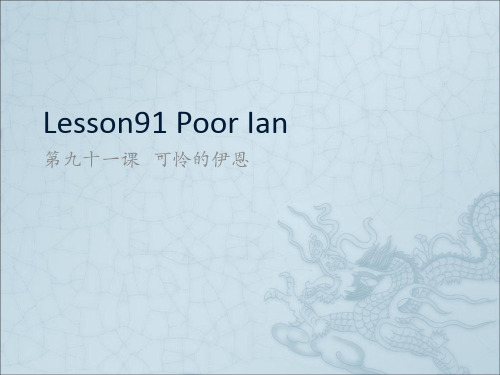
Let’s learn more
Miss 想念 I miss you. 我想你。 我很想家。 我会想你的。 我很想念我的奶奶。 Miss: 错过 I missed the train yesterday. 昨天我错过了火车。 我错过了那场电影。 我错过了妈妈的生日。
Let’s learn more
I'll be meeting him sometime in the future.
翻译下列句子
请代我向你家人问好! 他昨天没来,是吗?是的,他没来。/不,他来了的。 你明天做什么? 我要去踢球。 你去哪儿啊? 我去看看我的老师。 我和Tom都会想念你的。 我一点儿也不想去北京,但是我爸妈却很想去。 我上周已经去过图书馆了。 我已经买了这本书了。
按照中文习惯去赞同别人的说法,而是要根据 事实来说,因此回答no, he didn’t want to leave. 但是翻译成中文的时候要说,是的,他不愿意 离开。 例句: He didn’t go to school last week, did he?
No, he didn’t. 是的,他没去。 Yes, he did. 不,他去了的。
喜欢那里,我们回来得很晚,所以就没时间写作业了。 哦,这样呀,那我等等你吧。 真的啊?那太好了! 我很快就写完了。你明天做什么呢? 我明天要去找我的朋友玩。 哦,我能和你一起去吗? 好呀!我们早上一起去吧!你快去写吧,游泳池五点就关门了! 好的好的,我这就去!
homework
1.翻译短文。听写91,35,36单词,错一个改 五遍。并背会课文。
一般将来时
一般将来时表示将来某一时刻的动作或状 态,或将来某一段时间内经常的动作或状 态。常常和表示将来的时间状语连用。如: tomorrow(明天), next week(下周), from now on(从现在开始);in the future (将来)等。 一般将来时由助动词shall (第一人称),will(第二、三人称) 动词 原形构成。美国英语则不管什么人称,一 律用will。
新概念英语第一册ppt课件91课(推荐完整)

一般将来时
will+动词原形=be (am/is/are) going to+动词原形
区别;1. will表示没有事先考虑过的意图。 be going to则是 指事先考虑过的意图。
例如; --- It's heavy. ---- I will help you . Tomorrm is Sunday, I am going to have a rest.
2.will 表示说话人认为、相信、希望或嘉定要发生的事,不 含任何具体时间,可以指遥远的将来;而be going to指有 迹象表明某事即将发生或肯定发生,通常指很快就发生的事。 例如: He will get better.
Look at the clouds, it's going to rain.
I missed an opportunity of realizing my
dream. 我错过了一个可能实现自己梦想的机会。
★people n. 人们 集合名词 表示民族时 可加s ten people 十个人 56 peoples 56个民族
the peoples of China and USA (指两国人民,用复数形式)
1. I _____ leave)in a minute. 2. -How long _____ you _____(study)in our country? 3. I ______(be)tired. I ______(go)to bed early tonight. 4. Mary's birthday is next Monday, her mother _____ (give)her a present. 5. It is very cold these days. It ______(snow)soon.
(完整版)新概念英语第一册第91课课件

Lesson 91Poor Ian!1: still adv 还,依旧I still can’t decide where to go.⑴静止地Eg: He is sitting still.2: move V 搬家⑴Move from…to…从…搬到…Eg: They move from Nanjing to Shenzhen.⑵移动Don’t move that chair.⑶使感动,使动心Eg: Her song moved us greatly.3: miss V 想念,思念Eg: we will miss you very much if you move.I miss you so much!⑵注意到…的不存在When did you miss your bag?⑶错过或失去机会I missed a good chance. 4: neighbor N 邻居A good neighbor5: person N 人Eg: He is a nice person.In person 亲自,直接地Eg: He will go to get the money in person. Personal adj 个人的,私人的A personal letter6: people N 人们The people 民众,人民,国民7:poor adj 可怜的Eg: The poor old woman had no one to talk to.⑵贫穷的—richA poor manA poor villageThe poorEg: we should help the poor.⑶差劲的Be poor at sthBe poor at doing sthBe good at sthBe good at doing sthEg: My daughter is poor at swimming.Context:1: move to…搬家到…Eg: All her family have moved to the US.Move in 搬进(强调结果)Eg: His new neighbour moved in last week.Move out2: be going to do 打算做某事Eg: I’m not going to argue with you tonight.3: I’ll miss him.Miss 想念I miss my parents very mush.4: He has always been a good neighbour.现在完成时只要用于两种情况:1.表示在过去不确定的时间里发生的并与现在有着某种联系的动作2.开始于过去并持续到现在的动作5:all 大家,全部(3个或3个以上的人或物)两者6:new people 新住户Move into 搬进来(强调过程)Move in 搬进来(强调结果)7:give sb sthGive sth to sb 把…给某人Regards (复) 致意,问候Give him my regards Give my regards to him. 8: leave 离开Leave…for…离开…去…Eg: when will you leave China for England.Lesson 92When will…?语法:一般将来时一般将来时表示将来某一时刻的动作,状态以及打算。
新概念英语第一册91课

JENNY: I think that they'll move in the day after tomorrow.
将来时的时间状语
LINDA: Will you see Ian today, Jenny?
JENNY: Yes, I will.
I think + that 从句。 我认为…
否定形式:I don’t think + that 从句。 我认为不…
I’ll miss him. We’ll all miss him. When will the new people move into this house? I think that they’ll move in the day after tomorrow. Will you see Ian today, Jenny? Yes, I will.
Lesson91 Poor Ian
still
[stɪl]
还,仍旧
move
miss
[muːv] 搬家
[mɪs] 想念,思念 邻居 人 人们
neighbour ['neɪbə] person people poor ['pɝsn] ['piːp(ə)l]
[pʊə] 可怜的
move 的用法:
1. move home 2. move into + 宾语 搬家 搬入到…
3. move in(不及物动词词组后不跟宾语) 搬入
★move
• ②感动,打动 • This story moved me. • 这个故事感动了我。
★still
① adv. 还是,仍然 • I can’t still decide where to go. • 我还是不能决定去哪。
新概念一册91到100课原文及译文
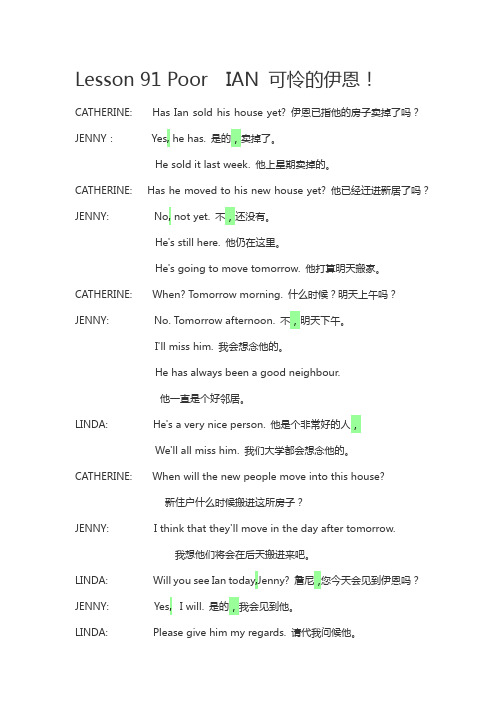
Lesson 91 Poor IAN 可怜的伊恩!CATHERINE: Has Ian sold his house yet? 伊恩已指他的房子卖掉了吗?JENNY:Yes, he has. 是的,卖掉了。
He sold it last week. 他上星期卖掉的。
CATHERINE: Has he moved to his new house yet? 他已经迁进新居了吗?JENNY: No, not yet. 不,还没有。
He's still here. 他仍在这里。
He's going to move tomorrow. 他打算明天搬家。
CATHERINE: When? Tomorrow morning. 什么时候?明天上午吗?JENNY: No. Tomorrow afternoon. 不,明天下午。
I'll miss him. 我会想念他的。
He has always been a good neighbour.他一直是个好邻居。
LINDA: He's a very nice person. 他是个非常好的人,We'll all miss him. 我们大学都会想念他的。
CATHERINE: When will the new people move into this house?新住户什么时候搬进这所房子?JENNY: I think that they'll move in the day after tomorrow.我想他们将会在后天搬进来吧。
LINDA: Will you see Ian today,Jenny? 詹尼,您今天会见到伊恩吗?JENNY: Yes,I will. 是的,我会见到他。
LINDA: Please give him my regards. 请代我问候他。
CATHERINE: Poor Ian! 可怜的伊恩!He didn't want to leave this house.他本不想离开这幢房子。
新概念英语91课讲义

Lesson 91 poor Ian 可怜的伊恩一、单词与短语still:adv.还,仍旧;move:v.搬家;关于move掌握两个短语:move into:搬进、、、例:Tom moved into a new house last week.汤姆上周搬进新家了。
Move out:搬出去;例:When will you move out from the house?你们什么时候从房子里搬出去?miss: v.想念,思念;例:I miss you terribly.我非常想念你。
关于miss还需要掌握它另外的一个意思:错过、、、或者:未赶上、、、、I am afraid that we will miss the train.我担心我们赶不上火车。
neighbour: n.邻居;person:n.人;people:n.人们;poor:adj.可怜的;例:What a poor guy he is.多么可怜的一个家伙。
poor另外的一个意思是:贫穷的;例:the poor:穷人们;the rich:富人们;二、短语、句型及语法1、He has always been a good neighbour.他一直是个好邻居。
①always“总是”的意思,它是一般现在时的显著标志词,一般跟一般现在时连用,但此处always却与现在完成时连用,always与现在完成时连用表示“一向、、、”或者“总是、、、”带有强烈的赞同或厌恶感情色彩,例:I’ve always believed he was wrong.我一直认为他是错的。
He has always been a good neighbour.他一直是个好邻居。
②掌握与always相关的一个常用搭配:be always doing sth: 总是、、、(带有强烈的感情色彩,表示厌恶或赞许)例:He is always making fun of me.他总是捉弄我。
裕兴新概念英语笔记:Lesson 91 Poor Ian

Lesson 91 Poor Ian!still adv. 还,仍旧move v. 搬家miss v.想念neighbour n.邻居person n.人people n.人们poor adj. 可怜的still adv.1)还,仍旧eg. I still can't decide where to go.我还是不能决定去哪儿。
eg. She was still beautiful at the age of 46.她46岁时依然美丽。
eg. I still use the watch you gave me.我还在用你给我的那块表。
2) 静止地;安静地eg. He is sitting still. 他一动不动地坐着。
eg. The patient is lying still. 病人安静地躺着。
eg. Please stand still while I take your picture.我为你拍照时,请站好别动。
move1)v.搬家move from…to… 从…搬到…eg. They moved from Nanjing to Shenzhen.他们从南京搬到深圳。
eg. We are going to move to a house in the country.我们将要搬到乡下的房子。
2)移动eg. Don't move that chair, because I've just painted it.请不要搬动那张椅子,因为我刚刚漆过。
eg. The teacher asked her to move to the front of the classroom.老师请她坐到教室的前面去。
eg. Move along, please. 往前走。
3)使感动,使动心eg. Her song moved us greatly. 她的歌深深地打动了我们。
eg. His story moved us to tears. 他的故事感动得我们流泪。
新概念英语第一册L91~92
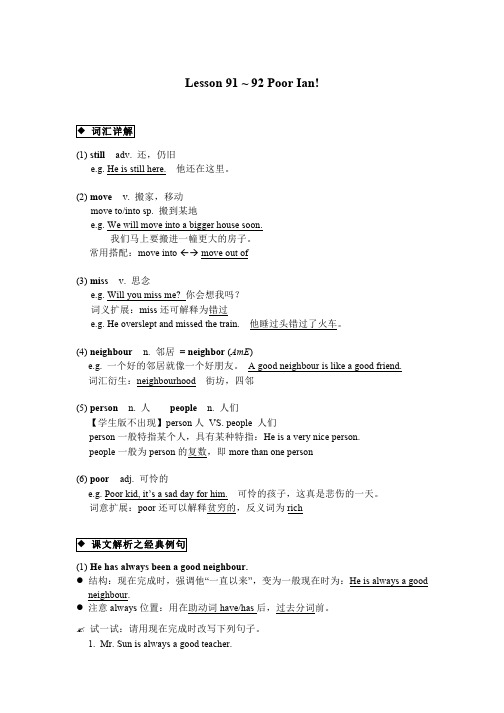
Lesson 91 ~ 92 Poor Ian!◆ 词汇详解(1) still adv. 还,仍旧e.g. He is still here. 他还在这里。
(2) move v. 搬家,移动move to/into sp. 搬到某地e.g. We will move into a bigger house soon.我们马上要搬进一幢更大的房子。
常用搭配:move into !" move out of(3) miss v. 思念e.g. Will you miss me? 你会想我吗?词义扩展:miss还可解释为错过e.g. He overslept and missed the train. 他睡过头错过了火车。
(4) neighbour n. 邻居= neighbor (AmE)e.g. 一个好的邻居就像一个好朋友。
A good neighbour is like a good friend.词汇衍生:neighbourhood 街坊,四邻(5) person n. 人people n. 人们【学生版不出现】person人VS. people 人们person一般特指某个人,具有某种特指:He is a very nice person.people一般为person的复数,即more than one person(6) poor adj. 可怜的e.g. Poor kid, it’s a sad day for him. 可怜的孩子,这真是悲伤的一天。
词意扩展:poor还可以解释贫穷的,反义词为rich◆ 课文解析之经典例句(1) He has always been a good neighbour.#结构:现在完成时,强调他“一直以来”,变为一般现在时为:He is always a good neighbour.#注意always位置:用在助动词have/has后,过去分词前。
概念英语一91课

Yes, I will.
Please give him my regards.
Poor Ian!
want to do
He didn't want to leave this house.
want to do
No, he didn't want to leave, but his wife did!
Lesson 91 Poor Ian!
What’s the matter with Ian?
poor adj. Is she poor?
Yes, she is.
Are they poor? Yes, they are. They are poor.
move v.
They are moving a ______.
people
There are hundreds of people in the street.
There are many people in the swimming pool.
Play a game
Guess :Where is the ball?
neighbour
poor
move
Guess :Where is the ball?
No, not yet.
He's still here.
is
He's going to move tomorrow.
will
I'll miss him.
has
He has always been a good neighbour.
He's a very nice person.
will
We'll all miss him.Fra bibliotekwill
- 1、下载文档前请自行甄别文档内容的完整性,平台不提供额外的编辑、内容补充、找答案等附加服务。
- 2、"仅部分预览"的文档,不可在线预览部分如存在完整性等问题,可反馈申请退款(可完整预览的文档不适用该条件!)。
- 3、如文档侵犯您的权益,请联系客服反馈,我们会尽快为您处理(人工客服工作时间:9:00-18:30)。
Grammar
一般将来时
I am going to see a play. She is going to go fishing. He is going to play football.
Move from…to…从…搬到… They moved from Nanjing to Shenzhen. 我们从乡村搬到城市。 We moved from country to city. 我们从南充搬到成都。 We moved from south to Chengdu.
来看这一组句子
He didn’t want to leave this house. No, he didn’t want to leave, but his wife did. 第二个句子是对第一个句子的证实,这里不可以 按照中文习惯去赞同别人的说法,而是要根据 事实来说,因此回答no, he didn’t want to leave. 但是翻译成中文的时候要说,是的,他 不愿意离开。 例句: He didn’t go to school last week, did he? No, he didn’t. 是的,他没去。 Yes, he did. 不,他去了的。
He has always been a good neighbour. 现在完成时 指Ian自从在这住开始到现在一直都很好 He’s a very nice person. 表达人的人品很好可以用good或nice。 person 强调的个体的人,可以有复数形 式persons people 通常是人的统称“人们,人民”, 本身是复数形式,没有单数形式
Listen and answer
Ian’s want wife.to sell the Who house?
课文讲解
-Has he moved to his new house yet? -No, not yet. Move to 搬到… e office in zone B tomorrow. Yet用于疑问句和否定句的句尾。 No, he has not moved to his new house yet.
Let’s learn more
Miss 想念 I miss you. 我想你。 我很想家。 我会想你的。 我很想念我的奶奶。 Miss: 错过 I missed the train yesterday. 昨天我错过了火 车。 我错过了那场电影。 我错过了妈妈的生日。
Let’s learn more
Person 表示单个人 People 表示人们,是复数。 She’s the right person for this job. There’re a lot of people in the park. 我们家有三口人。 There are three people in my family. 他是做老师的不错人选。 He’s the right person for a teacher.
He’s still here. = He is still here. 副词still也可用于一般现在时,注意位 置在be动词之后。 He’s going to move tomorrow. be going to do 计划、打算做某事。 I’ll miss him. = I will miss him I miss home very much. He missed the train yesterday. I miss you because I missed you.
Lesson91 Poor Ian
第九十一课 可怜的伊恩
单词学习
still move miss neighbour person people poor
adv. 还,仍旧 v. 搬家 v. 想念,思念 n. 邻居 n. 人 n. 人们 adj. 可怜的
★still adv. 还,仍旧 ① adv. 还是,仍然 我仍然不知道他是什么意思。 I still don’t understand what he meant. 她46岁了却依然美丽。 She is 46 years old and still very pretty. 我还在用你送我的那块手表。 I still use the watch that you sent to me.
★move v. 搬家;感动 这个故事感动了我。 This story moves me. move to 搬到……地方 move in 搬进 move out 搬出来 move away 搬走 我们下个月将搬到乡下 We'll move to the country next month.
Please give him my regards. give sb. sth. = give sth. to sb. 给某人某 物=把某物给某人 请代我们问候你的父母 Please give your parents our regards. Please give our regards to your parents. Poor Ian! 同情某人时的常用语。
When will the new people move into this house? move to = move into 搬进。 people = neighbours 她是这个职位的合适人选。 She’s the right person for this job. 公园里有很多人。 There’re a lot of people in the park.
